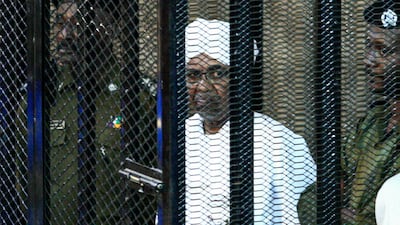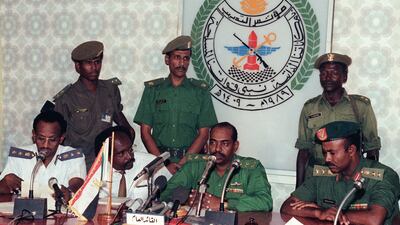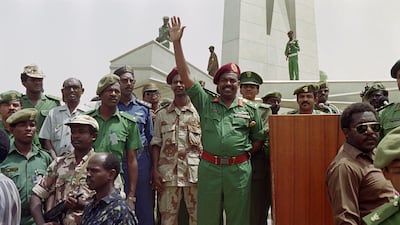Egyptian lawyer Nasser Amin had long suspected that the brutality of the Darfur conflict would eventually come before the International Criminal Court.
He did not have to wait long before the chance arose to bring to justice perpetrators of atrocities during the war in Sudan, in which at least 300,000 people died.
But the journey Mr Amin and like-minded lawyers took to build a case against those accused of war crimes in the early 2000s was fraught with difficulty.
The 57-year-old spoke to The National as nearly two decades of work on the conflict began to bear fruit.
The ICC will use the evidence collected by Mr Amin and his team in the prosecution of Ali Muhammad Ali Abd Al Rahman, better known as Ali Kushayb, a notorious warlord suspected of 31 counts of war crimes and crimes against humanity in Darfur.
“All those interested in the idea of international justice and the case of Darfur, in particular, were on the verge of being acutely disappointed,” Mr Amin said. “None of the victims could imagine that the day would come when one of the perpetrators would be brought into a courtroom to answer for his crimes.”
Besides Abd Al Rahman, the other four indicted men are the ousted dictator Omar Al Bashir — wanted for crimes against humanity, genocide and war crimes — along with his one-time defence and interior ministers. More than 40 others, including Darfur rebel leaders, are suspected of committing crimes but have not been indicted.
In the insurgency in the 2000s, Darfur’s ethnic Africans rebelled against the central government to demand an end to what they saw as discrimination by Khartoum and to secure a larger share of national resources.
The government of Al Bashir fuelled the division.
“I personally felt that the perpetration of the atrocities in Darfur just one year after the establishment [in 2002] of the International Criminal Court was a blatant insult to the efforts made to create a body specifically to fight such crimes,” said Mr Amin, who took part in 13 rounds of preparations in the New York UN headquarters between 1998 and the ICC inception in 2002.
Besides the hundreds of thousands of people killed in Darfur, 2.5 million others were displaced. Many of them still live in squalid camps elsewhere in Sudan and in Chad, although the conflict has generally died down.
“It was a provocative and defiant act against the notion of international criminal justice,” said Mr Amin, who traces his interest in international justice to the 1990s, when special tribunals were set up by the UN Security Council to try suspects of genocide in Rwanda and the former Yugoslavia.
“Those special tribunals showed a hint of political bias. Many equally appalling crimes have been committed and went unpunished. That’s why what I and others wanted to see was a permanent international court.”
Mr Amin described the rush to collect evidence as the first signs of the darkness of the conflict spilt out of Sudan in 2003 and 2004.
Aided by a team of researchers, he began to document claims that crimes against humanity, war crimes and even genocide had been perpetrated in the remote Sudanese region, mostly at the hands of government troops and allied militiamen.
The work was cut out for the investigators.
Egypt and Chad had become the two major destinations for people fleeing the war. The researchers travelled to refugee and displaced camps in Chad and Sudan to collect testimonies from survivors and witnesses.
Now out of harm’s way, the refugees and displaced people shared harrowing stories of indiscriminate killings, mass rapes, torture, forced evictions and torched villages.
The Colonel of Colonels
The significance of Abd Al Rahman’s detention and trial cannot be overstated.
Known to his followers as the “Colonel of Colonels,” Abd Al Rahman, a tall and slender man in his 50s, is notorious for allegedly being the most ruthless and brutal of those on the ICC wanted list.
“Ali Kushayb faces the largest number of charges among all Darfur-related suspects,” said Mr Amin.
“He was a senior Janjaweed leader and continued to commit crimes until his indictment in 2007,” he said, referring to the militia enlisted by the government to fight the rebels and widely believed to be behind the largest share of atrocities in Darfur.
Under yet unclear circumstances, Abd Al Rahman gave himself up to authorities in the Central African Republic in June 2020. Now in ICC custody in The Hague, Abd Al Rahman’s faces 31 charges. His first pretrial hearing was held in January and he appeared in court again for procedural hearings on May 24-26.
The prosecution has 45 days from the date of the last hearing to file a final sheet of charges, which already include war crimes and crimes against humanity.
Mr Amin, who joined world-renowned rights lawyer Amal Clooney in the case against Abd Al Rahman, represents scores of victims. His investigation has focused on five Darfur localities in the Wadi Saleh area where the accused allegedly committed most of his crimes in 2003-2004. They include instances when he was personally involved, according to Mr Amin.
“The spirits of the victims and the voices of the raped women … loom over this room where we are all sitting, appealing to this tribunal to confirm the charges the accused is facing,” Mr Amin told the court on a live video link from Cairo in May.
Ms Clooney said of the accused, who sat silently in the courtroom wearing an ill-fitting grey suit and a tie: “He never showed any mercy towards his victims. He loaded them on vehicles that took them to where they were executed.”
She said Abd Al Rahman hit the captives with an axe or a whip, ordered his men to “only kill” and took part in the killings “when he felt like it”.
The defendant’s lawyer, Cyril Laucci, argued that the court had the wrong man and his client was an “ordinary man” who made a living selling medicine.
Mr Amin, having waited for years to see one of the main perpetrators of Darfur crimes held accountable, knows that his work is far from done.
“Now that we are in the stage of an actual trial, we need to do more work with the survivors. We must firm up their stories by talking to more witnesses. We need to make the evidence stand courtroom scrutiny,” said Mr Amin.
Echoes of the 2018-2019 protest movement
Bringing the perpetrators of the Darfur crimes to justice was a key demand by activists behind the deadly street protests that led to the ouster of Al Bashir in April 2019.
Many of their chants accused Al Bashir, who has been in detention since 2019, of being a racist and a bigot.
However, many in Sudan suspect the generals who removed Al Bashir in 2019 and now hold top jobs in the transitional administration that succeeded him are reluctant to hand over the former dictator to the ICC, fearing he might reveal information that could incriminate them. The ICC does not try defendants in absentia.
Significantly, Sudan’s deputy head of state, Gen Mohammed Hamdan Dagalo, was a Janjaweed commander during the war before the rag-tag outfit was sanctioned by Al Bashir as a paramilitary force associated but not fully part of the armed forces.
Gen Dagalo has repeatedly denied any part in the atrocities perpetrated in Darfur and claims to have played a key role in the decision by the army to remove Al Bashir.
To this day, many activists are convinced there could be no stability or peace in Sudan, for decades bedevilled by ruinous civil wars, unless the underlying causes of the Darfur conflict are removed.
“I am a native of Darfur and no one wants to see justice for its war victims more than I do. It’s the question of all questions,” said Baroud Sandal, a rights lawyer and an expert on his home region.
“We cannot bring back the dead, but I want the suspects to be tried in Darfur for everyone there to see justice done. The December revolution’s main slogan was ‘freedom, justice and equality’ and the Sudanese judiciary is capable of trying them. That’s all we need,” he said.
Peace talks between the most powerful rebel group in Darfur and the government were suspended earlier this month to give the two sides time to consider compromises. Meanwhile, occasional deadly clashes between Darfur’s Arabs and ethnic Africans continue to erupt to this day at an alarming frequency, a grim reminder that peace there remains elusive.
“There will be no peace in Darfur until the displaced are able to return to their villages and take back their land, which is now in the hands of the militias,” said Qurashi Awad, a Sudanese political analyst who has monitored the situation in Darfur for years.
“It is not so much about rebel calls for secularism or an end to discrimination as returning the land illegally taken away.”








